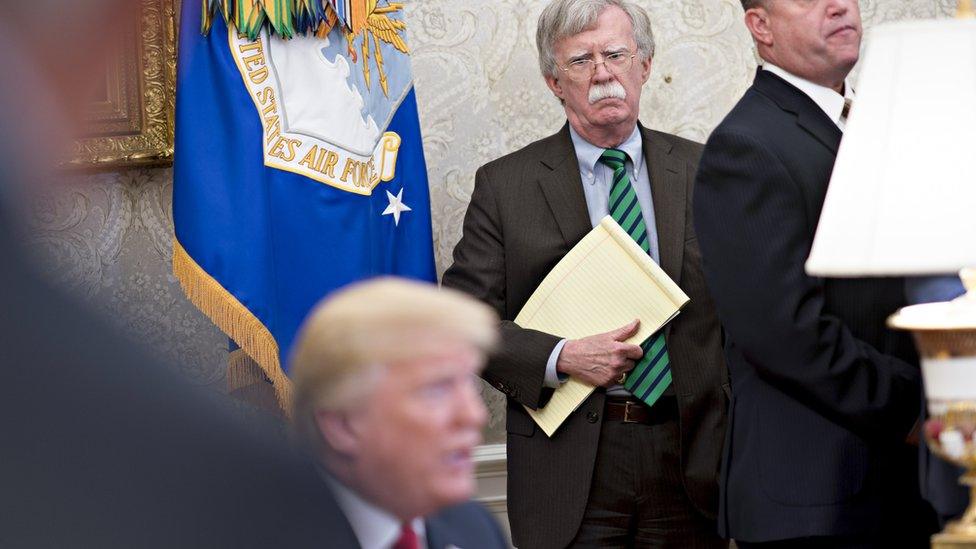North Korea summit: Trump says deal with US will save Kim Jong-un
- Published
Trump on Kim meeting: 'North Korea would be very rich'
President Donald Trump has said the US is not pursuing the "Libya model" for the denuclearisation of North Korea.
Mr Trump said Kim Jong-un would stay in power if he made a deal, and hinted he could be deposed if he refused.
Libya's Muammar Gaddafi agreed to give up nuclear weapons in 2003. He was later killed by Western-backed rebels.
Most analysts say North Korea was angered by the prospect of a Libya scenario precisely because of what happened to Gaddafi.
The comparison was made by Mr Trump's National Security Adviser John Bolton.
It led the North to threaten to pull out of the summit with Mr Trump in Singapore on 12 June.
What did President Trump say?
As Mr Bolton looked on, the US president said: "The Libyan model isn't a model that we have at all when we're thinking of North Korea.
"The model, if you look at that model with Gaddafi, that was a total decimation. We went in there to beat him. Now that model would take place if we don't make a deal, most likely. But if we make a deal, I think Kim Jong-un is going to be very, very happy," Mr Trump said.
"He'd be there, he'd be in his country, he'd be running his country, his country would be very rich."
On the planned summit, Mr Trump said: "Nothing has changed on North Korea that we know of. We have not been told anything.
"And if it does that's fine and if it doesn't I think we'll probably have a very successful meeting."

John Bolton looked on as President Trump made his feelings clear
Why does Libya haunt Kim?
North Korea's suggestion that it might pull out of the US summit pointed the finger squarely at Mr Bolton.
"We do not hide our feeling of repugnance towards him," said Wednesday's statement, which was written by Vice-Foreign Minister Kim Kye-gwan.
North Korea was apparently referencing an interview Mr Bolton gave comparing it to "the Libya model" of denuclearisation.
In 2003, Libya's Colonel Muammar Gaddafi agreed to give up his country's programmes of weapons of mass destruction in an announcement that surprised the world.
Most US sanctions on Libya were lifted within a few months and diplomatic ties between the countries restored. The North African country came in from the cold.
But in 2011 the authoritarian leader was toppled by rebels and militiamen backed by Nato. He was later captured and killed by rebel forces.
Why has North Korea changed its tone?
Also on Thursday, North Korea said it would not resume talks with the South until issues between the two are resolved.
Pyongyang has been angered by continuing US-South Korea joint military exercises which it sees as a rehearsal for invasion. It cancelled planned high-level talks with South Korea earlier this week.
In a statement, chief negotiator Ri Son-gwon reverted to the angry language the North has used before, describing South Korean authorities as incompetent and senseless in comments reported by state news agency KCNA.
He also criticised South Korea for allowing "human scum" (a reference to a North Korean defector) to speak at the Seoul National Assembly.
Why North Korea is angry at this man
Thursday's criticism of South Korea marks yet another shift in tone from Pyongyang just weeks before the planned US summit, the BBC's Laura Bicker in Seoul says.
Pyongyang appears to be putting pressure on both the US and South Korea and refusing to talk until some concessions are made, she adds.
What does this mean for the nuclear issue?
At the summit between the leaders of North and South Korea on 27 April both sides agreed to work to rid the Korean peninsula of nuclear weapons.
But Pyongyang's professed commitment to "denuclearisation" is likely to differ from Washington's demand for "comprehensive, verifiable and irreversible" nuclear disarmament.
South Korea's Foreign Minister Kang Kyung-wha told MPs on Thursday there was a gap between North Korea and the US on "how to pull off denuclearisation",, external according to South Korea's Yonhap news agency.
North Korea said last week it would begin dismantling its nuclear test site at Punggye-ri between 23-25 May, but there was no mention of allowing foreign experts access to the site.
On a recent visit to North Korea, US Secretary of State Mike Pompeo stressed that any claim of denuclearisation by the North would require a "robust verification" programme by the US and other nations.